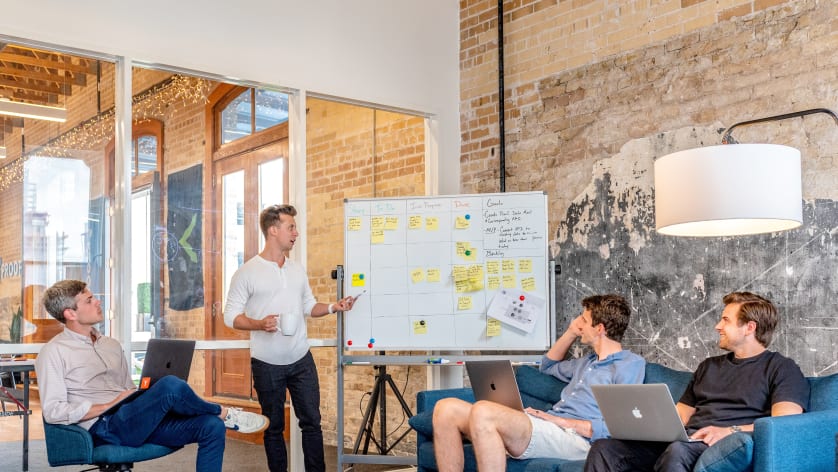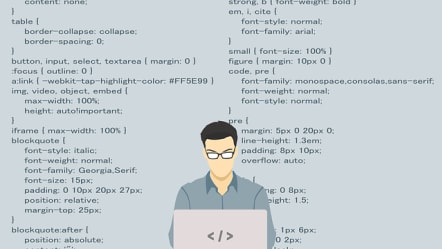26 tips for job interviews to leave a good impression

For Bill, it took one hour to prepare for a job interview, for six months, six days a week. And it paid off. He got a job at Amazon as AWS-Software engineer.
“I was really nervous. I did not sleep the night before the interview”, he remembers, “if i messed it up, that would have been six months wasted.”
Tips for a job interview:
• Research the company and the position.
• Learn more about the interviewer/HR manager.
• Practice answers to common interview questions.
• Ask thoughtful questions in return.
• Don't badmouth former employers.
• Send a thank you message to make a good impression afterwards.
• Puneeth landed a job as a software development engineer at Amazon AWS on his second try after stepping up his preparation efforts.
"Amazon has these guiding principles and they asked me questions about them at all stages of the interview process," Puneeth said. "This time I was much better prepared for the technical questions and I think my preparation was more thorough as well."
If you are looking for tips on interviewing for AWS jobs, you should join the free weekly Ask Me Anything (AMA) online sessions offered by Zafar Choudhury, Amazon AWS's lead internal recruiter.
Google for example also offers insight into their application-process. There you can get useful tips for your job interview. Always look at the career page, provided the company has one.
HR managers and internal recruiters at Amazon, Twilio, and BeyondTrust, as well as career experts at top tech universities, offer these important steps to take before, during, and after your interview to secure a coveted spot at the company you want.
Tips for the job interview
Don't be so sure you have the job just because a headhunter reached out to you.
"Even if I had come up to you and said, 'Hey, this would be a great position for you, would you apply?' The job still wouldn't be yours. Just because the recruiter found you doesn't mean the HR manager is on board with you at that point. You still have to prepare and show that you can communicate effectively, showcase your strengths and value." said Santina Pitcher, Assistant Director of Consulting and Programs.
Follow these steps to best prepare for your next job interview.
1. RESEARCH ABOUT THE COMPANY
Gather more information about the company's products, services, values, mission, management team, board members, and current company announcements.
"I can't tell you how many times I've sat in an interview and asked the candidate, 'What do you know about us?' and the answer is, 'Well, I was on your website and that's all I know,' said Dermot Williams, Senior Director of Engineering at cybersecurity firm BeyondTrust. 'Every company like ours has great information in blogs and whitepapers. If you spend an hour or two reading them, you get a sense of who we are and it shows that you're interested in us.'"
Knowing the Amazon leadership principles is key in the interview process, said Bruschi and Choudhury.
Reading company reviews on Glassdoor is another way to prepare for an interview, as it can provide information about what potential and current employees have to say about interview questions the company may ask, said Rachel Amos, director of career services and employer relations. Also, read the company's social media posts on Twitter, Instagram and other sites to better understand the company, she added. This information can help you better prepare for your interview and ask the right questions.
Do you know the specifics of the job you're applying for and the department or division it's in? This question was posed by Marvin Lopez, director of student programs, who added that applicants sometimes go to interviews without fully understanding the role. This gives hiring managers and recruiters the impression that you would take any job.
"When applying for a job, review the company's website and social media to offer examples of how you fit into or contribute to the company's culture, team, core values, product or service direction," Leena Macwan, a lead recruiter at Zynga.
2. LEARN MORE ABOUT YOUR INTERVIEWERS BACKGROUND
Look at their LinkedIn profile, read their Blogs and Social-Media-Content and don't forget to google their name to find out more.
„Using this information as an icebreaker to start the conversation when you meet them,“ said Choudhury. „You can say, ‚I read that you gave a TED talk last year, or I saw that you gave a presentation on cybersecurity.‘ HR loves it because it shows that you have done your due diligence and homework.“
Talk to current or former employees of the company you will be interviewing with who are also graduates of your university, Pitcher advised. Ask them to take a few minutes to talk to you about the company culture and how things work there, she said, adding that they are likely to agree to speak with you nine times out of ten. They may also be familiar with the people you will be interviewing with, and so can give you some insights into making a good impression.
3. ADAPT THE JOB DESCRIPTION AND COMPANY CORE VALUES TO YOUR SKILLS AND ATTRIBUTES
„It's important to remember a few key points from the job description and match them to your experiences. However, you should be able to connect these points to a strong example that demonstrates certain skills,“ said Amos.
For example, a startup states in its job description that it is looking for a software engineer who is comfortable working in an ambiguous environment with many demanding deadlines. Let's assume that you worked in such an environment in your previous job and developed successfully. Point this out to the interviewer and provide data or information to support this, For example, you've consistently turned in projects a day or two ahead of schedule, even though the scope of work has increased weekly.
4. PRACTICE THE NEEDED HARD SKILLS
LeetCode and HackerRank were great tools to help Bruschi and Rangaswamy prepare for their Amazon interviews. They said the examples used were very accurate to what they found in the coding tests they took.
„It's important to think out loud so the interviewer can hear your thought process and encourage you to ask questions,“ said Bruschi. „You're essentially working with the interviewer to solve the present problem.“ It's so important to practice whiteboard tests where you think out loud and share your thoughts and reasoning with the interviewer.
She added that it's important to brush up on the fundamentals required for the specific position you are seeking and to be able to demonstrate the depth and breadth of your skills in solving programming questions.
5. CONSUME RELEVANT RESOURCES
Amazon's technical questions were mostly about algorithms and data structures such as arrays, trees, string manipulation and graphs, Rangaswamy said.
"When I first applied to Amazon, I hadn't prepared extensively. But this time, I focused specifically on data structures and algorithms and was able to apply them appropriately in the interviews. I felt that was the main difference this time, " he said.
His reading material included a GitHub post, a coding blog, and watching coding YouTube videos.
6. CREATE FLASHCARDS
Preparing for an interview over a long period of time can have its drawbacks, Bruschi said.
"I didn't want to forget anything I learned six months ago, so I used flashcards with Spaced Repitition," he said. Anki is one of the flashcard tools he uses, which displays new and more complicated information more frequently than older and easier-to-understand material.
7. REVIEW YOUR INTERVIEW ANSWERS.
Find a friend, family member or colleague to conduct a mock interview and practice answering questions about why a company should hire you. And while it may not mimic the feel of a real interview, Amos notes that it's better than nothing. "It's good to be confronted with questions, and it forces you to come up with an answer quickly," she said.
Conducting a mock job interview provides an opportunity to get feedback on your body language as you answer questions, Pitcher said. Do you cross your arms in front of your chest or avoid eye contact in an in-person mock interview? Or are you constantly looking down in a virtual mock interview instead of looking into the camera at the interviewer?
8. FIND A DISTRACTION-FREE ENVIRONMENT.
Choose a location for your virtual interview that is quiet and free of distractions such as pets or children, which will help you stay focused during the interview, Choudhury said. It's also important to test the microphone and webcam before the interview to make sure they both work.
Another important preparation step is to test your Internet connection well in advance of your interview so you have time to strengthen your connection if needed, Williams said. "If our video call keeps dropping during the interview and the picture is blurry, I'll look at that and say will it be the same when you're working from home?"
Find a place to place your resume so it's out of the camera's field of view but easily visible during the virtual interview, recruiters said.
9. VISIT THE INTERVIEW SITE IN ADVANCE.
If you have a morning interview, visit the employer's work site a day early to investigate traffic and potential parking issues, Choudhury said. And if your interview is in the afternoon, arrive early to allow enough time for potential problems.
10. MAKE COPIES OF YOUR RESUME.
Print two or three extra copies of your resume to bring to the interview when you go in person.
"I've experienced this on several occasions where the interviewer suddenly wants to ask someone else for a second opinion," Choudhury said. "Wouldn't it make you look more professional if you pulled a second resume out of your folder and gave it to us? This keeps you prepared and looking ahead of the game. Those are leadership things we look for.”
11. CHOOSE YOUR OUTFIT THE NIGHT BEFORE
Amos stated that a neat and clean appearance is critical in in-person interviews and should include business casual, neither a three-piece suit nor blue jeans and a t-shirt.
Having a similar wardrobe for a Zoom interview is also important, she added, as it can help you to have a solid mindset during the interview.
12. PRACTICE ACTIVE LISTENING AND OBSERVE YOUR BODY LANGUAGE
Pitcher said to always listen actively when answering questions in an interview.
"I've had instances where I've asked a question and then the candidate has moved on to a whole other topic after I didn't ask," she said. "In my mind, I think maybe they just flipped because they had no idea how to answer the question or they weren't listening."
If you answer a question, answer it thoughfully, advises Choudhury.
“You could say: ”That's a goodquestion", and take a few moments to think about a good reply", says Choudhury.
He also proposed that you mirror your conversation partner's body language and tone to make it more comfortable for him. If an interviewer has a high energy level, you should too. If they lean back while talking, follow their lead. This will make you more attractive as a candidate, and is an effective communication tool.
13. PRONOUNCING THE INTERVIEWERS NAME CORRECTLY
If you aren't sure how to pronounce your interview-partners name, try typing it into YouTube or other Video platforms to see how it is pronounced, says Amos.
if this does not work, ask the interviewer to pronounce his name and repeat it to make sure you have understood him correctly.
"It's important to try and say someone's name correctly," said Amos, adding, "but don't let embarrassment stop you if you can't."
14. PREPARE ANSWERS FOR DIFFICULT QUESTIONS
The following five questions will make the most difference to you whether you get hired or not.
5 interview questions with the most meaning:
• What are you most curious about?
• Can you describe a project that you recently executed with your team lately?
• How do you react to setbacks?
• How do you structure and prioritize your day?
• What were you most proud of about your last project and what was the biggest challenge?
"We want to understand how a candidate works and whether their style aligns with our values and principles," said Bryan Powell, Senior Vice President of Talent Acquisition at Twilio, a cloud communications platform company. "Questions that get to their ability to be an owner, their curiosity, and their approach to building and problem solving are important to us."
15. DON'T FORGET TO PREPARE ANSWERS FOR “YOUR BIGGEST WEAKNESSES”
Don't be afraid to talk about your weaknesses in an interview - it shows you're honest and working to improve.
Instead of giving answers that are not weaknesses, like “too hard working”, be honest with your interviewer.
Pitcher views herself as an introvert and has found that it can be a positive trait. "I've found that in my previous job, it was really helpful because I worked with teams and was able to be a really good listener," she said.
16. DON'T SPEAK ILL OF PREVIOUS EMPLOYERS
“It’s important to always be positive about your team and never put anyone down if you want to do well in your interviews,” Choudhury said.
Your future employers are looking for team players that can take responsibility for their actions. Blaming others reflects poorly on you and your work ethic.
17. ELIMINATE DISTRACTIONS
“I remember an interview when a guy took two phone calls. I immediately stopped and told him we would have to reschedule for a time when he is more available", said Lopez, a former tech hiring manager.
Phone calls as well as texts disrupt the interview and make you seem very unprofessional. Therefore, switch your phone to airplane mode or turn it off.
18. ASK QUESTIONS
"If a candidate has no questions, it means they're not interested," Lopez said.
So, be prepared and do some research about the position.
6 Questions to ask in a job interview:
• What are my daily responsibilities?
• What character traits do you look for in a new colleague?
• How is the working climate in your teams?
• Can you tell me about the company's core values?
• What are my future team managers like?
• How does the company recognize certain values?
19. DONT HESITATE TO ACKNOWLEDGE IF THE INTERVIEW IS GOING WELL
Keep going when interviewers ask probing questions and the conversation gets deeper. It is a sign that the interviewer is enjoying the conversation.
If you're receiving extra attention from the company, it's a good sign that they're seriously considering you for the position.
20. RECOGNIZE IF THE INTERVIEW ISN'T GOING WELL
If your interviews are cut short, it's likely that the hiring manager doesn't think you're a good fit for the position. Williams noted that long pauses and gaps in conversation are usually not a good sign.
21. DEMONSTRATE YOUR WORKING ETHIC
It's always best to avoid thrusting your work samples upon the interviewer without giving them a chance to review it first. If you have work samples, it's best to wait until the end of the interview to offer to show them, so they don't feel obligated to review it right away.
22. END THE INTERVIEW WITH QUESTIONS ABOUT WHAT'S NEXT
"How soon do you think the company will be hiring for this position?", is a better question than asking what the next step in the hiring process will be.
"Don't put the interviewer on the spot by asking how you did," Lopez said, “they likely won't answer that question, and you don't want to make them feel uncomfortable, you can follow up after an interview by sending a thank-you note.”
23. WITHIN 24 HOURS, SEND A THANK-YOU EMAIL
Be sure to include specific information about the topics you discussed in the interview, such as system design or data structures, Choudhury said. "I appreciate your time," is a great way to show your appreciation.
24. IF YOU DON'T HEAR FROM THE INTERVIEW DON'T HESITATE TO ASK
If you don't hear back from the company after a couple of weeks, reach out to the recruiter or the person who set up the interviews. You can let them know you are interested in the position and would like to inquire about the company's timeline for filling the role.
Career experts say that following up on your status two or three times is usually fine, but after three follow-up attempts, it’s usually better to move on.
25. ASK FOR POSSIBLE IMPROVEMENT SUGGESTIONS
It's important to inquire about ways you can improve your candidacy if you were not selected for the position and you still want to work at this company in the future. You're more likely to get what you want by asking questions than making assumptions.
Some exceptions:
“If you follow up with the recruiter, they will be able to give you some feedback that will help improve your chances,” Macwan said. Being open with candidates about where they stand in the process and why they might not be a fit for the role is very important.
26. STAY POSITIVE
Rebounding after a loss is difficult, but it's essential to maintain a positive attitude. Don't get discouraged if you don't get the job- there are many other opportunities out there for you!














